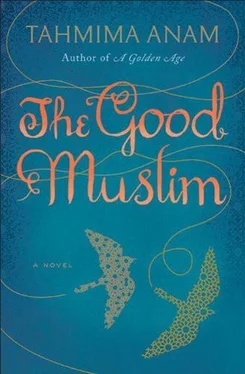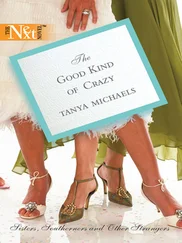All Ammoo wanted was a prayer. Surely she could give her that. She tried to unlock the words, but they were buried deep, and knotted among all the other things. The disappointments, the heartache, the state of the country and the Dictator who said Allah between every other word — all latched on to those words, that Book. Don’t worry, she wanted to tell her mother, we don’t need Aytul Kursi. We have science. But she couldn’t help but remember that every death she had ever witnessed — on the battlefield, at the field hospital, in the wards — had been accompanied by the sound of prayer, the same words embroidering every parting of flesh and spirit.
Dr Sattar pulled the curtain aside and stepped in. A clutch of medical students followed, crowding into the space. ‘Is my patient ready?’ He picked up the chart at the foot of the bed.
Rehana waved at him, as if from a great distance. ‘Dakhtar, you needn’t have come yourself.’
Dr Sattar surprised Maya by smiling. ‘Nonsense. We take good care of our own, don’t we, Dr Haque?’
‘Yes, sir,’ she replied.
He ordered the students to check Rehana’s blood pressure and adjust her IV. They shuffled nervously around him. ‘Your brother is waiting outside,’ one of them said.
‘Brother?’ Maya and Rehana spoke in unison. For a moment Maya thought it might be a distant cousin of her mother’s, here from Karachi after receiving the telegram she had sent their relatives about the surgery. Then she knew it must be Sohail.
‘Ma,’ she said, ‘I’ll just be back. The nurse will be here if you need anything.’
Sohail was leaning against the balcony railing, his eyes on the mosaic tiling below. The sky was darkening overhead, purple and grey, the air quiet, everything hovering in that moment before the afternoon rain.
‘How is Ammoo?’ he asked.
‘She’s fine. You should go in and see her.’ Our mother might die and we might be orphans and I might be your last remaining kin. Was he thinking the same thing?
‘The surgeon—’
‘He’s very experienced, don’t worry. She’ll be all right.’ Or she won’t. Was he persuaded by the tone she tried to bring to her voice, the doctor’s certainty?
He nodded. ‘Inshallah.’
‘And you, are you well?’ She looked him up and down, her eye lingering on the bruise that blossomed on his forehead, pearly and blue-black, from his daily submission to the prayer mat.
‘I am well, by the Grace of Allah.’ It started to rain, that slanted, sideways rain that reminded Maya of childhood, the smell of wet cement, the two of them rushing to close the windows before the mattresses were soaked. Sohail did not retreat from the edge of the railing, Maya too remained beside him, and now they were both being pelted with rain. His beard took on the sheen of water. He straightened, fixed his gaze on her. Was it tenderness she saw? She struggled to keep her eyes open against the torrent. It would be too much , she wanted him to say, too much to lose our mother now . But instead he said, ‘Zaid tells me you’re teaching him the English letters.’
‘Yes. Soon he’ll be reading Middlemarch .’
He laughed. She laughed. The rain stopped as suddenly as it began. She wanted to hug him, and she did, and he returned her embrace, squeezing his arms around her. Rain mixed with tears, salty and warm.
‘Nothing bad will happen, Bhaiya,’ she said.
‘Sister Khadija told me you taught Zaid to play cards.’
‘Yes,’ she said, ‘he’s a shark.’
‘Sister Khadija is dismayed. Gambling is not allowed.’
Maya stepped back, the shock of his words dipping slowly, painfully into her. ‘But it’s just a game. Ammoo plays too.’
‘You know the difference between Halal and Haram. If you don’t, then perhaps Sister Khadija should take over Zaid’s education.’
That’s not what she had meant. She felt desperation spreading through her. ‘Please, no.’
He put his hand on her shoulder, as though she would have trouble understanding otherwise. ‘The boy misses his mother, I know that. I should give him more time, but. .’
She tried to keep the sarcasm out of her voice. ‘Your duties?’
He looked wounded, his gaze pointing beyond her, to the small patches of sunshine now visible through the clouds. ‘A boy needs to find his way in the world.’
She wasn’t sure what he meant, but she wanted to agree with him, to tell him it was all right, that he was doing his best. It couldn’t be easy, raising a son. He was laying down the law, she could see that, but he made it appear as if he had no choice, as though there were something natural about the rule he was imposing. She struggled with herself, knowing that if she pushed too hard he might abandon her entirely, that perhaps he was giving her this chance simply because his wife was not here to admonish him, dead before she could pour that last drop of venom into his ear and make him deaf to her for ever. Maya tried to be grateful for this.
‘Go in and see Ammoo — she’s expecting you.’ And she turned around and made her way down the stairs and towards the operating theatre, drying her hair with the end of her sari, the rain still heavy on her cheek.
Sohail finds, in the spring after he has returned from the war, that his hands will not stop shaking. He holds his hands to his chest. He wraps them around the teapot. He stands on the threshold of his mother’s room. Ma, he wants to say, my hands will not stop shaking. Will you say a prayer and blow on them? Will you twine your fingers through mine and bind them to yours? But he stops. He isn’t a child any more; he’s a man, a soldier back from the war. He asks himself if he can be right again, if he can be good. After Piya, after the killing.
This is how the war made its way into their house. Sohail, spilling water from his glass, flicking dal over the side of his plate. A vanishing woman. A shake of the hand. A silence between siblings.
He had killed an innocent man. The man was not an enemy, not a soldier. Just someone who had let the wrong word come out of his mouth. There is only one way to be good now. The Book has told him he is good, that it is in his nature to be good. The words have been reclaimed and he swells up with love for the Book. Weeks after Piya has disappeared — leaving only the faint trace of her scent, which he tries to pick up in the kitchen where she had squatted, or the rectangle on the floor where she had spread her sleeping mat — he finds himself climbing the ladder up to the roof and sitting cross-legged under the open sun. It is May, a windless, rainless month, heat tearing through the sky. He sits and reads the words. His mother has given him the Book and he reads the words, refusing to see his friends or celebrate the victory. Dimly, he hears them: time to go back to the university; stop worrying your mother, na, and be happy, yaar, war is over. Time to sell-e-brate.
Most of all he is afraid to talk. Maya is always regarding him hungrily, eager for small scraps of detail. Yesterday he told her about the food at the guerrilla camp, how it had danced on his tongue though it was only a few spoonfuls of rice and dal. Freedom food. She devoured the story, begged him for more. How greedy she is. He wants her to be quiet so she can hear the roar in his head, thinking that if she could hear that roar, the roar of uncertainty and the roar of death, she might understand. But she refuses to be quiet for long enough. She searches his face and then she launches into her latest story, telling him who has returned from the war, who has lost a son, a brother. Worse things have happened to other people.
I have committed murder . If he were to tell his sister about the war, this is what he would have to tell her. She wants stories of heroism. She wants him to tell her that he planted bombs under country bridges and that he got away just before the flame hit the powder, and that the felled bridge cut off the army, and the people of north Tangail or Kushtia or Bogra were saved.
Читать дальше












